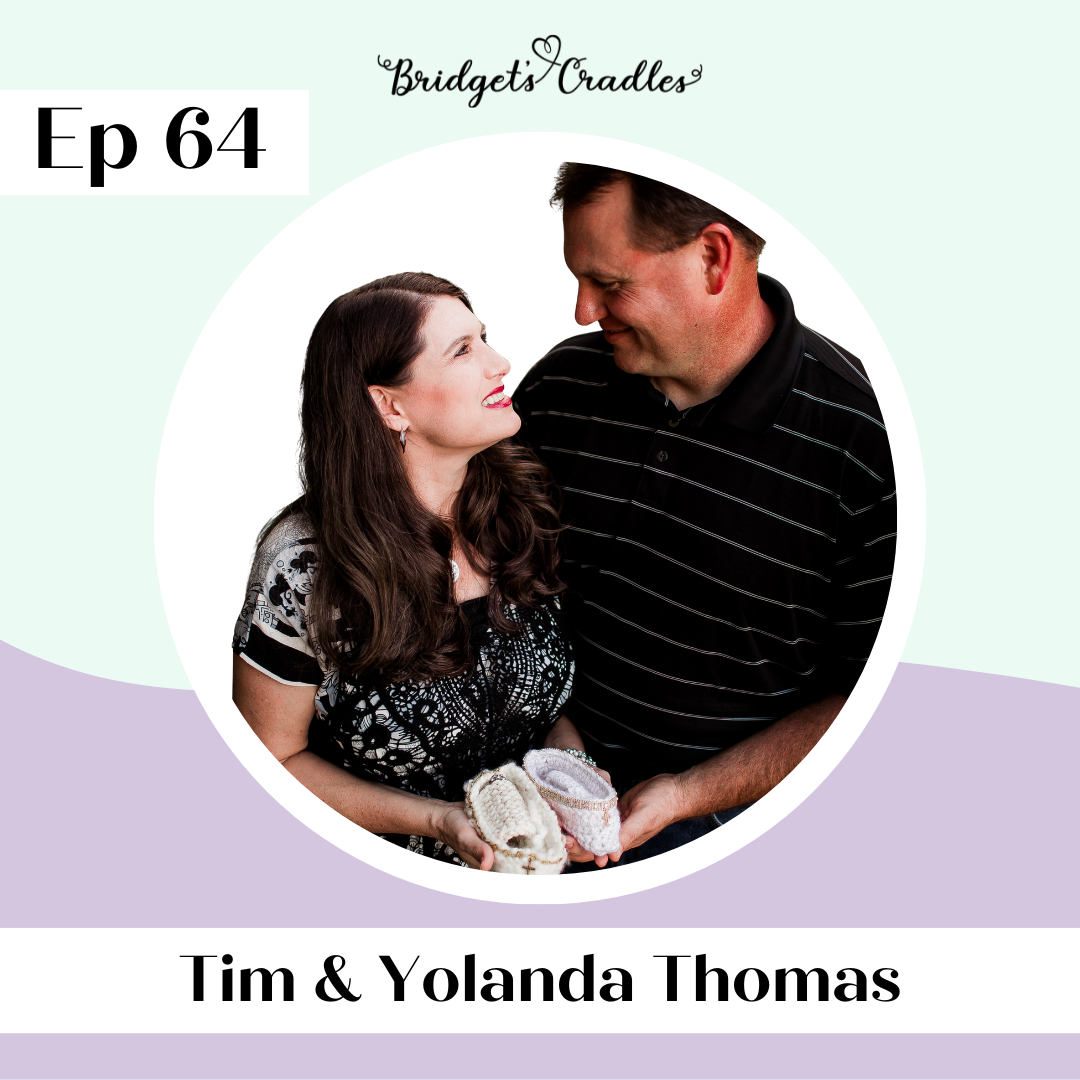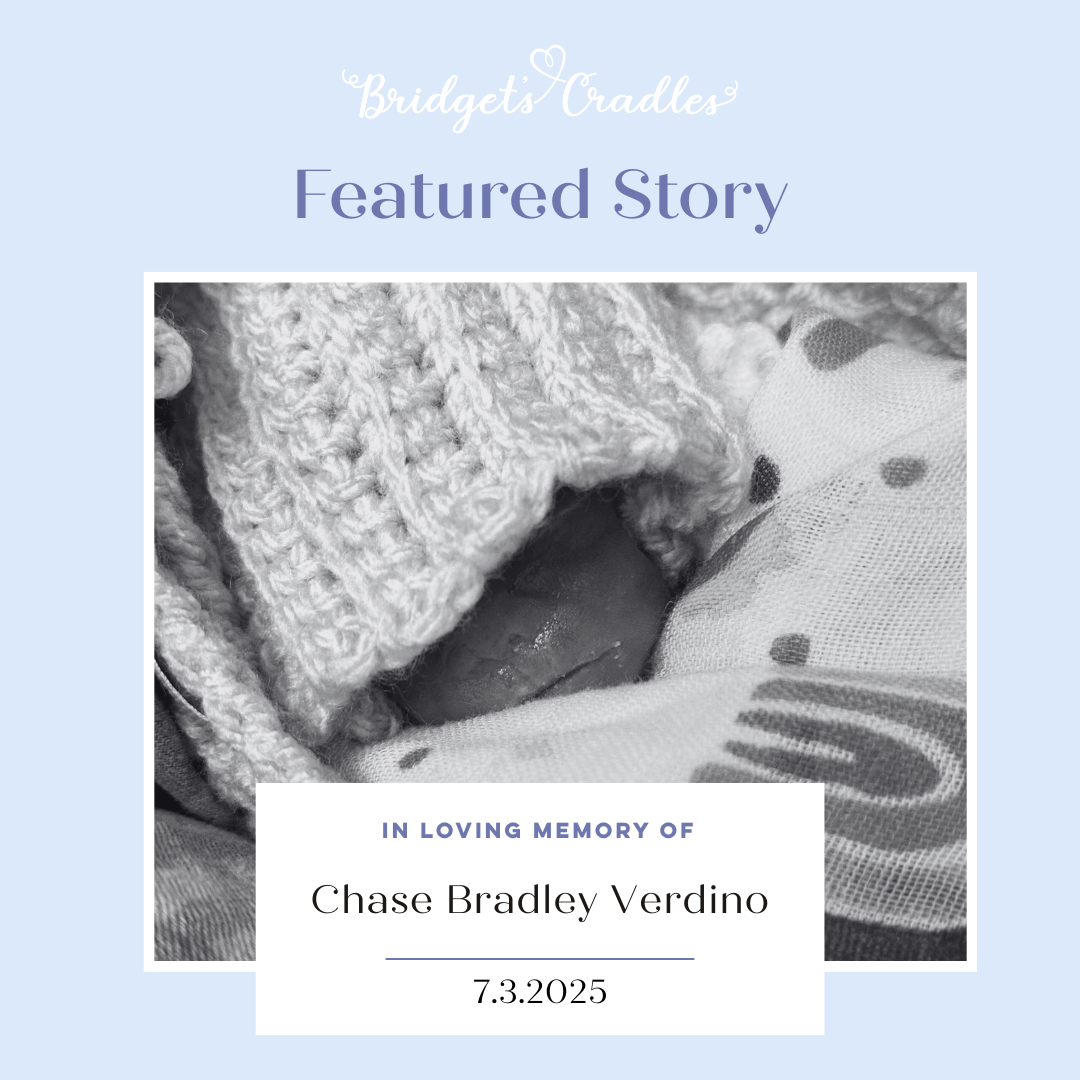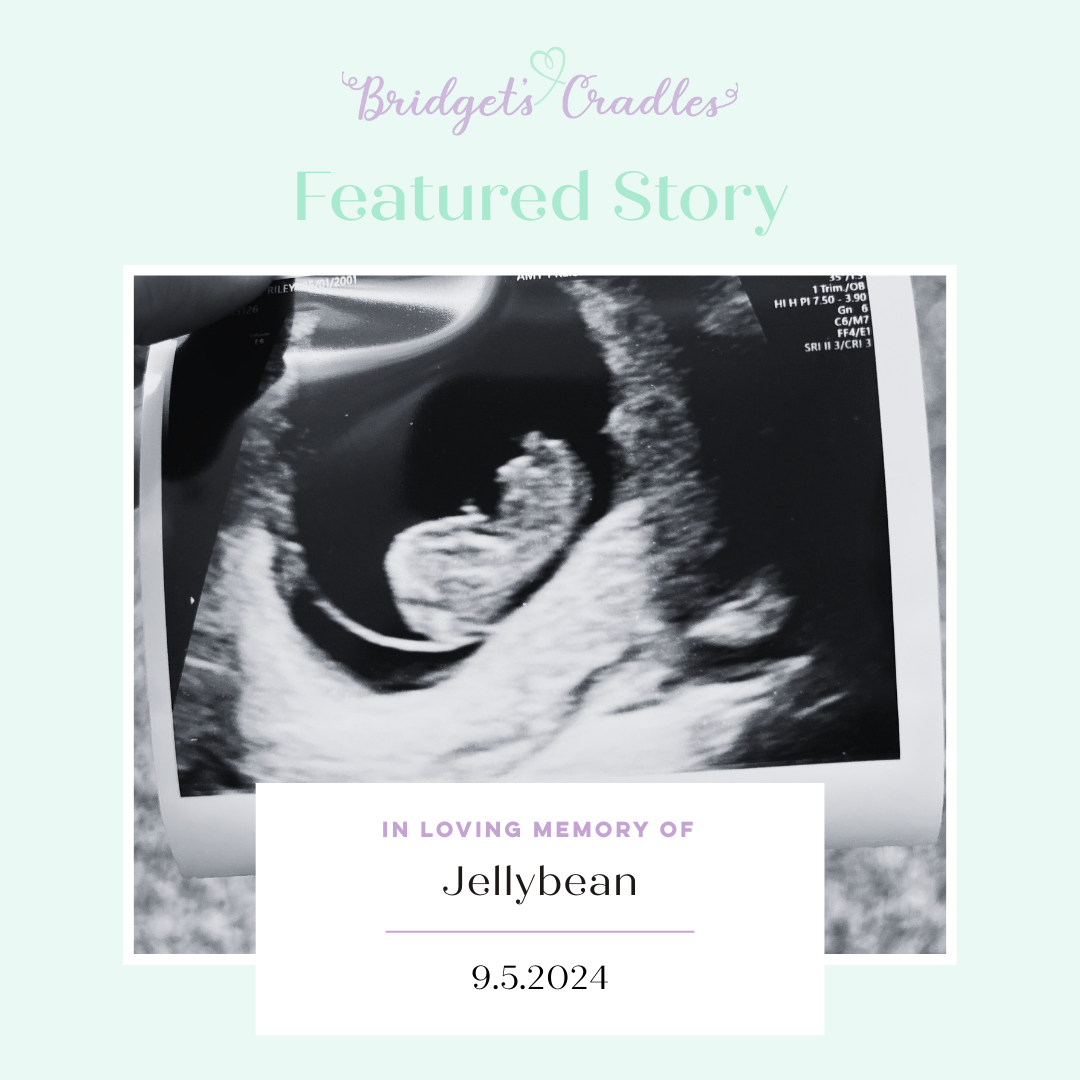Wave of Light | October 15, 2025 Register Now
registration open!

Join us for a conversation with Sarah Philpott, author of Loved Baby, about how to navigate the painful journey of grief after pregnancy loss. Sarah shares her story of growing up as a rainbow baby herself and then experiencing multiple miscarriages while trying to grow her own family.
Living a life acquainted with loss, Sarah discusses with Ashley how she grieved with hope and found joy in the perfection of Heaven. She encourages grieving moms to embrace Christ and use their spiritual gifts to shine His light after pregnancy loss.
In this episode, we discussed:
Why you shouldn’t feel guilty for grieving losses early in pregnancy
Practical ways to navigate triggers such as baby registry emails in your inbox, formula packets coming in the mail, and invitations to baby showers
How to protect your heart while you’re grieving by putting up boundaries with social media and friends or family who are pregnant
Breakdowns in marriage after loss and how to reconnect with your spouse
Why our spouse cannot be our source of healing and how to rely on Christ instead (and give our spouses grace in the process)
How to choose faith over fear when trying to conceive again
Honoring our babies and our Father in Heaven by rejoicing in our suffering, shining the light of Jesus, and being sanctified to be more like Him
Sarah’s healing process of writing Loved Baby and how God used her spiritual gifts to comfort other grieving moms
Full transcript below.

CONNECT WITH OUR GUEST
Sarah Philpott is the author of the award-winning book: Loved Baby: 31 Devotions Helping You Grieve and Cherish Your Child After Pregnancy Loss.
Sarah lives in Tennessee on a cattle farm where she raises her four children and is farm wife to her high-school sweetheart. Sarah is the founder of the Loved Baby support group and #HonorAllMoms Mother’s Day movement.
Connect with Sarah:
Facebook /sarahphilpottwrites
Instagram @sarahlphilpott
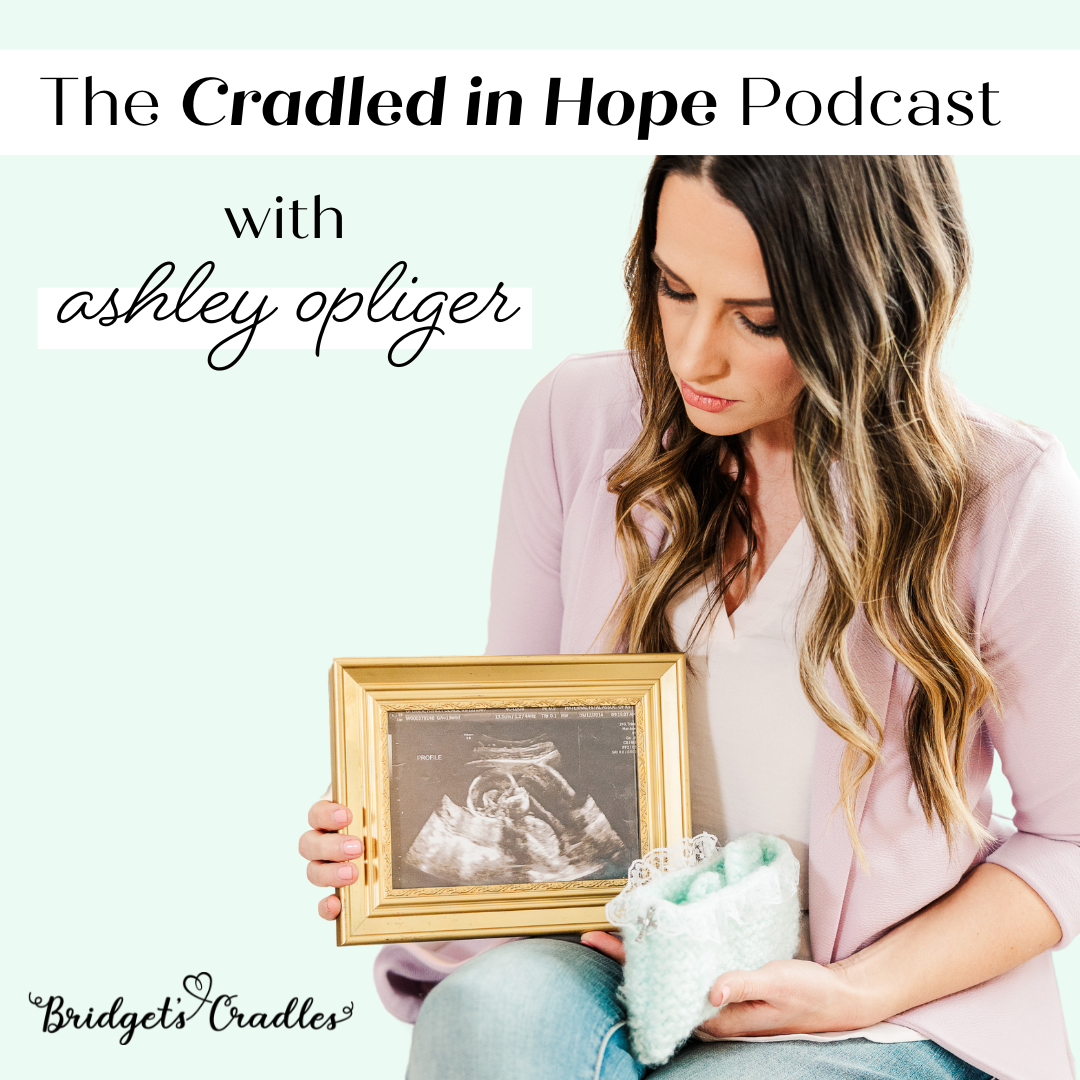
New episodes will be shared on the 1st of every month. Don’t miss a single episode…subscribe wherever you podcast!
Please also leave a review to help spread the message of hope with other grieving mommas!

MEET OUR HOST
Ashley Opliger is the Executive Director of Bridget’s Cradles, a nonprofit organization based in Wichita, Kansas that donates cradles to over 1,600 hospitals in all 50 states and comforts over 30,000 bereaved families a year.
Ashley is married to Matt and they have three children: Bridget (in Heaven), and two sons. She is a follower of Christ who desires to share the hope of Heaven with families grieving the loss of a baby.
Connect with Ashley:
Facebook /ashleyopliger
Instagram @ashleyopliger
Pinterest /ashleyopliger
www.ashleyopliger.com
Follow Bridget’s Cradles:
Facebook /bridgetscradles
Instagram @bridgetscradles
Pinterest /bridgetscradles
www.bridgetscradles.com
JOIN OUR CRADLED IN HOPE COMMUNITY FOR GRIEVING MOMS
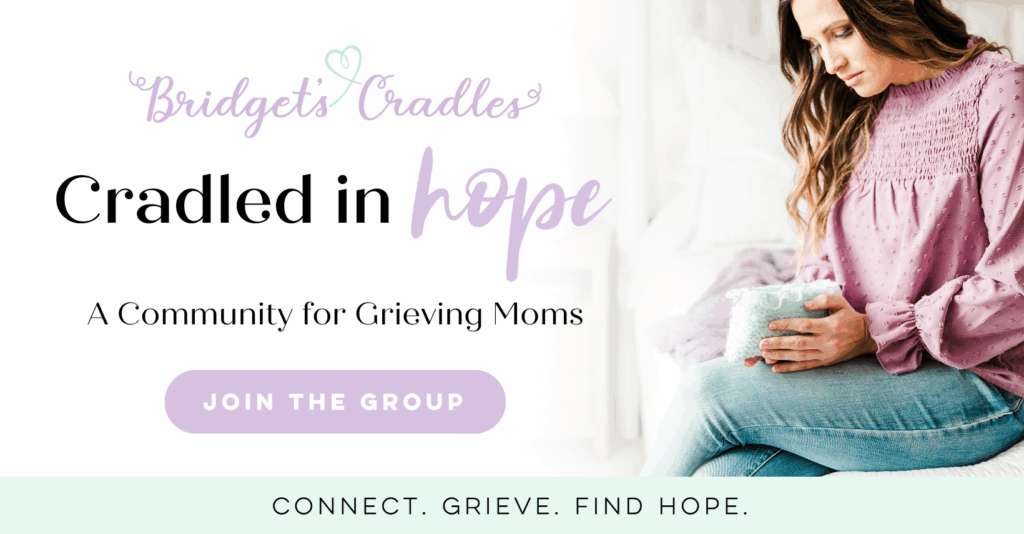
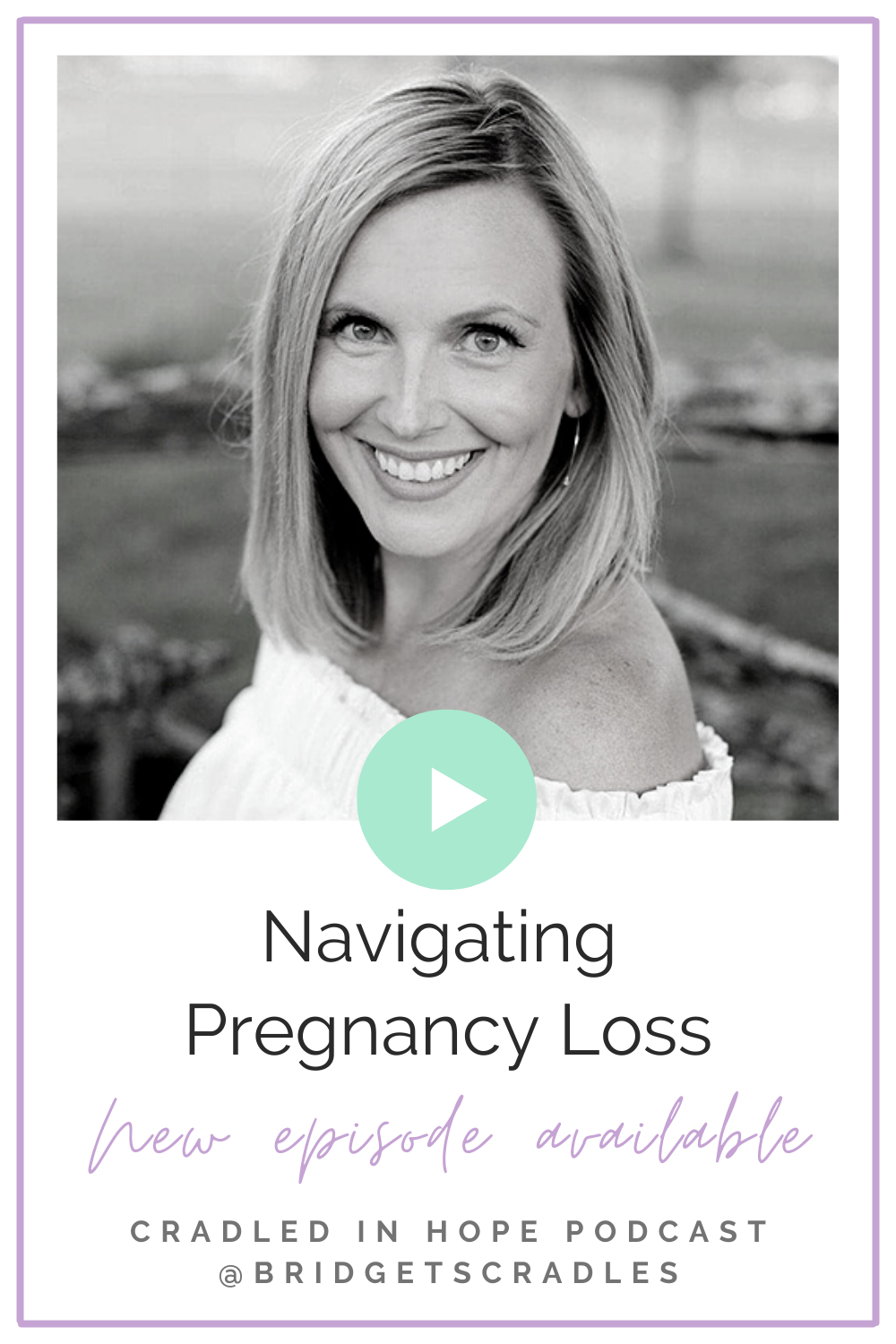
EPISODE TRANSCRIPT
Episode 3: Navigating Pregnancy Loss with Sarah Philpott
Ashley Opliger: [00:00:00] You’re listening to the Cradled in Hope Podcast where we believe that the hope of Heaven, through faith in Jesus Christ, has the power to heal our hearts after the loss of a baby. It’s a pain no mother should have to endure and we want this podcast to be a safe place for your broken heart to land. Here, we are going to trust God’s promise to restore our joy, use our grief for good, and allow us to spend eternity with our babies in Heaven.
I’m your host, Ashley Opliger. I’m a wife, mom, and follower of Christ clinging to the hope of Heaven. My daughter, Bridget, was stillborn at 24 weeks in my first pregnancy in 2014. In her memory, my husband and I started a nonprofit ministry called Bridget’s Cradles, and God has given us purpose in our pain and we’ve seen beauty come from ashes.
Although we wish you didn’t have a need to be listening to this podcast, we believe God has a reason for you to be here today. We pray this time would be a source of healing for you as we remember that Jesus cradles us in hope while He cradles our babies in Heaven. Though we may grieve, we do not grieve without hope. Welcome to the Cradled in Hope Podcast.
Today we have the honor of welcoming Sarah Philpott to the Cradled In Hope Podcast.
Sarah is the author of the award-winning book, Loved Baby: 31 Devotions Helping You Grieve and Cherish Your Child After Pregnancy Loss. Sarah lives in Tennessee on a cattle farm, where she raises her four children and is a farm wife to her high school sweetheart.
Sarah is the Founder of the Loved Baby Support Group and #honorallmoms Mother’s Day movement. Today, we are going to talk to Sarah all about Loved Baby and some of the key messages she shares in the book, including navigating triggers after pregnancy loss, and also how to reconnect with your spouse.
I can’t wait for you to hear all of the amazing wisdom Sarah has to share with you. Let’s welcome Sarah Philpott.
Welcome, Sarah. We are so grateful you’re here today.
Sarah Philpott: [00:02:16] Oh, I’m so excited to be here with you. Thank you so much for having me.
Ashley Opliger: [00:02:24] We just had a wonderful conversation before we clicked record, and I am so grateful for your ministry and this book, Loved Baby, that you wrote. I would love to have our audience hear more about you and your story and how you came to write this beautiful book.
Sarah Philpott: [00:02:40] Oh, let’s see. Where do I even begin? So I’m Sarah and I live in Tennessee on a cattle farm, and I have four children. My oldest is 10 and my youngest just turned one on May 5th. And I have a wonderful husband and we’ve been blessed to live outdoors and enjoy our life with each other.
My journey of loss, I am actually myself a rainbow baby. I was born on the night of a double rainbow, but I was also symbolically my mom’s rainbow because my mother before I was born, had a stillbirth at seven months. So I was always really aware of loss and how it could impact people. And there was something a little different about even being the sibling of a child who I knew was in Heaven. And we had a grave at our local church for him. His name, they always called him Bud; my mom just called him Rosebud.
So I guess my whole entire life I’ve been impacted by loss. I had my first child Titus, who’s now 10, actually, he’ll be 11 in two weeks, and it was a great pregnancy. And when he was about a year and a half old, we decided we were ready to expand our family.
And that bliss that comes with youth, that it’s just going to be easy, we just decide when we want to have a baby and we’re going to have a baby, was really, I guess the idea of that, did not come true, because after I saw the pregnancy test and we were so elated and excited, very soon after I found out that I was going through a miscarriage. And it really rocked my world.
We were no strangers to loss. My husband’s sister actually passed away at the age of 20, about three weeks before my husband and I had gotten married. So we had been very impacted by loss our entire life. There were a lot of other things that happened and here I was having a miscarriage.
And one of the first things I felt while having the miscarriage was I felt guilty. I felt guilty that I was sad, because here my family had been through such loss of siblings, and here I was mourning a baby that was in my body for just a few weeks. And was this even worthy of mourning? I found myself holding all of my loss inside of me because I didn’t really want to talk about it. I didn’t know how to process it.
And I really at that time had to rely on God to figure out how and if I should mourn. And one of the first places He took me was to meet Hannah in 1 Samuel. And I realized then that if Hannah can mourn the loss of infertility, that of course I could mourn the loss of this child.
So that was my first experience of loss, and it really brought me so much faith, in retrospect, that my very first loss is the thing that I really do credit with knowing God, knowing Jesus to a better degree, because it forced me to truly look inward.
So we had that loss, and then I was petrified. I didn’t want to have another baby. I was going to be happy with our child, Titus. As most women or a lot of women, you’re fearful of trying again, putting your heart on the line.
And when I found out I was pregnant again, I don’t want to say I didn’t want that child, but I was scared to death when I saw the pregnancy [test] and I just had this fear of, “What’s going to happen? Is this child going to make it? Should I try to love this baby?” Of course, we all love our babies, but I think women of loss could understand what I’m saying. “Do I put my heart on the line?”
Ashley Opliger: [00:07:19] It’s scary to connect when you don’t know. And you have a whole chapter about being pregnant again and choosing joy over fear and you talk about this. And I think this is so common after you’ve experienced loss to experienced fear, and it’s a traumatic experience to have a miscarriage or go through stillbirth.
Your body and mind, it’s so hard to want to put yourself through that again because you don’t know: “Will this happen again? Will I be able to survive this again?” So would you speak to what you shared in this chapter about how you were able to find hope and find faith to go through future pregnancies again and not live in fear?
Sarah Philpott: [00:08:03] Yes, because that is the key, is to not live in the fear of the future.
After I became pregnant that second time after the loss, unfortunately, I did lose that baby again, so I had a recurrent miscarriage, and that again, brought me to my knees. But I knew that with the cross I could do anything. So then we found out I was pregnant again, and this time I decided that I was going to have to choose faith over fear.
And I think as women of loss, we have to completely surrender to the fact that God leads our path. We don’t have to fear because God’s going to lead our path. And it really brought me such joy to know that my children that I had lost weren’t gone forever. They’re in Heaven.
We all know that Heaven is perfection. And how can perfection exist without children’s giggles? So I like to think that I am, although I’m a mother of loss, I was chosen to be a mother who is helping fill Heaven with little children dancing on the streets of gold.
So that was one of the great images that helped me through the next pregnancy, and so to put my trust in God that I had helped create Heaven to be an even more perfect place, but that this child that I was carrying, it’s God’s. And no matter what happens, whether this child is born into earth or into Heaven, it is God’s child and I’m going to just fully embrace and love, and let Him direct my path.
So it’s a challenge when you’re pregnant after a loss, it’s a challenge after a loss, truly, Anytime you have a loss, your whole life becomes a little bit more complicated, but it gives way to so much opportunity for truly embracing Christ and what faith means, to walk forward even when you don’t know your future.
Ashley Opliger: [00:10:01] Absolutely, and that connection to Heaven becomes so much more real. And I love that beautiful image that you just painted for us of Heaven being filled with precious children and babies. And like you said, this is a temporary separation. We are not eternally separated from our babies. Death separates us now, but we’ll get to see them forever and ever in eternity.
And I just love the song Amazing Grace and how after a thousand years there’s going to be even more days and a thousand more years after that to rejoice and be with our babies forever. And the short amount of time that we had to hold them in our wombs on earth, that will pale in comparison to what we’ll have in Heaven. And it’s a beautiful thing to look forward to and to have that hope. And honestly, without that hope, I don’t know how we could grieve our children. You know?
Sarah Philpott: [00:10:53] I don’t either. I think that’s what separates Christians from non-Christians is that we get to grieve in that hope. And the Bible tells us it’ll just be a little while ‘til we see that glory.
And while we’re earthside, living our life. I think that was one thing that I really just fell into that this is the day the Lord has made. I will rejoice and I’ll be glad in it. I kept telling myself that every single day when I was going through my anxiety and going through the fear of moving forward, that this is the day, whether I’m saying it crying, “this is the day the Lord has made,” or I’m angry or I’m rejoicing, I am going to choose to rejoice because God has given us so much beauty all around to live.
And it is our responsibility as a Christian to let our lights shine and to lead others to Christ. And the way we do that is through living out the walk of life He wants us to live, but at the same time, knowing that our children are in Heaven. It’s such an important thing to rest in the hope of the future, but also live in the present and allow ourselves to shine our light.
Ashley Opliger: [00:12:05] That’s so beautiful. And I love that you mention that because of course, we know grieving is so important. We have to grieve. We have to let ourselves feel the sadness and go through those emotions. But something I always tell moms is: Our babies and our Father in Heaven, He doesn’t want us to live in this perpetual state of sadness and depression because of the loss of our babies. There’s a time to grieve and then there’s a time to heal. And then to shine our light [Christ in us] and our babies are honored when we do that.
And our Father in Heaven, He is honored when we use our grief for good and we shine our light [Christ in us] and we share the Gospel and we share this hope with other people because we don’t want to live the rest of our lives in anger and bitterness and sadness. We need to process those emotions. I’m not saying we shouldn’t, but at the same time, we really do want God to grow us in this, through this pain, and make us more like Him, like Christ.
And so I just love that you shared that perspective of grief because I don’t think that’s talked about enough. And that’s part of our faith journey as well, being sanctified through the trials and the losses that we go through in this world.
Ashley Opliger: [00:13:17] We hope you are enjoying this episode so far. We wanted to take a quick break to tell you about some other hope-filled resources our ministry provides to grieving families.
On our website, bridgetscradles.com, you can find many resources on grieving and healing including memorial ideas, quotes & Scripture, blog articles, featured stories, recommended books, and other support organizations. We share ideas on how to navigate difficult days such as due dates, Heaven days, and holidays. We also have a page with ideas on how to care for a friend or family member who has experienced pregnancy loss.
In addition, every month I lead free Christ-centered support groups for bereaved moms called Hope Gatherings, both in-person and online. You can find a list of upcoming dates and sign up for our next support group on our website. You can also join our private Cradled in Hope Facebook group for grieving moms to find friendship and support. We would be honored to hear your baby’s story and be praying for you by name.
Lastly, our Pinterest page has beautiful graphics of quotes & Scripture from this episode, along with many other resources that you can pin and save. We would also love for you to connect with us on Facebook and Instagram. You can find us on these three pages: @bridgetscradles, @cradledinhope, and my personal page @ashleyopliger. We’d love for you to follow along and spread the word about the Cradled in Hope Podcast. Now let’s get back to our episode.
Ashley Opliger: [00:14:56] Will you tell us more about Loved Baby, you writing this book and having a heart for sharing the message of hope with other moms and where, in your own grief journey, you started writing and how God put that on your heart?
Sarah Philpott: [00:15:11] It’s kind of ironic, you mentioned that, after just saying that we can’t pass over the stage of grief.
I actually wrote Loved Baby while I was smack in the middle of the ugly grief that we all face as mothers of loss. It started out as a book, a journal. That’s how I process. I have lots of friends and I love talking to them, but for me, I need to write down my emotions to process them.
I needed to figure out how I felt. And so I just started writing and that process of journaling was so cathartic to me. And I encourage loss mamas to just get a piece of paper and start writing because it really made me break through a lot of the painful memories that I didn’t even want to acknowledge that had happened.
So the book started as my journal. And then I had just recently earned my Ph.D., and I had decided at that time that I wasn’t going to go back into the education field. I was going to stay at home with my then baby, my rainbow baby, who had just been born, but I was really praying about, “God, how can I use my spiritual gifts, because I’m not going back into the classroom. I’m going to be at home with my little girl, Sophie, for a while. How would You have me use my gifts?”
And it couldn’t have been clearer. I opened up my mommy Bible one day and, I kid you not, it said, “So you just bought a new house, you just got a new job, or you just earned your Ph.D.”
Ashley Opliger: [00:16:49] Oh, my goodness!
Sarah Philpott: [00:16:49] “How can you use your gifts for God?”
And I thought, “Okay, God, you have my attention. I’m listening.” And it had some follow-up questions and I analyzed the: What are my gifts? And I just started laughing. I was like, “Well, I’m great at research. I love finding out what other people think. You’ve given me a gift of writing,” and I just laughed. I was like, “God, I don’t know how I’m going to use this to Your glory.”
And the follow-up Bible verse took me to 1 Samuel, where Hannah appears, where she’s crying out to God about her infertility. And it all came together in one of those moments. “Okay, God, You made me feel less alone by me reading about Hannah. I’m supposed to help other women feel less alone by writing about the experience of loss, but not just my experience.
I’m going to use the gifts you’ve given me of research by amassing a group of women and letting them tell me their stories. And I’m going to share those stories in a book so that we get a wide range of experiences,” because I had faced a miscarriage, two miscarriages, but I’d never had a stillbirth so I didn’t feel like I could authentically write to that.
So. I put together a group of women who were also willing to share their stories of loss, the husbands started sharing their stories, and I put it all together and used my random skills as a researcher to put it together in the form of a book. And a year or two later, and a lot of fighting to try to get the book published, I was able to get it out to the world. And Broad Street Publishing, who published this book, they knew that grief books were not a hot topic; it wasn’t probably going to appear on a bestseller list.
But they said, I’ll never forget the conversation when the two men contacted me about publishing the book, and they said, “We just want to make a difference in the lives of women, because we can see the heart pains that women are experiencing through loss.” And God has been so faithful because the book started out as this idea, this seed, as you and I talked about earlier, and it bloomed into something quite amazing.
And I’m not saying this because I’m trying to brag, but I’m just saying that God honored this book so much that it’s won awards. It’s surpassed everyone’s expectations as far as selling. And I just felt like that was God’s way of showing love to women who I feel like historically have been, not a little bit, but a lot ignored.
The pain of loss has historically been ignored and it shouldn’t be. We can’t marginalize these feelings of loss. We have to understand that it’s weighty, it’s heavy, and that women need an opportunity to process grief. Their families need an opportunity to process grief, and that’s why I wanted it to be grieving and cherishing your child, because we have to go through the mourning, but we also have to have the hope. We have to have both sides of that coin. So that’s a little bit about how the book came to be.
Ashley Opliger: [00:20:06] Well, Sarah, it is just so beautiful. I love this book. It helped me through my own loss. And then leading support groups. I told you this earlier, but so many moms have told me that they’ve found comfort in this book.
And then on support groups online, I’ve seen so many moms, when they’ll reach out on the Facebook group and say, “Are there any books that you recommend,” and I always see this one recommended. And it’s because it is written directly to the heart of a grieving mom. You’ve done such a beautiful job of putting stories together.
One of the many things that I love about it so much is it’s packed with so much wisdom and practical ideas. You have lists in here of ideas on reconnecting with your spouse, and you talk about so many of the nitty-gritty aspects of grief.
After you’ve gone through pregnancy loss, there are triggers that happen afterward. You get mail from Baby Center and emails, and formula comes to your house, and you have to go back to the doctor’s office, and your period returns, and you talked about all of these very specific moments of grief. And so I just want to honor you and what you’ve done, and I know that God is honoring it in getting the word out about this book.
But I hope that every mom listening would go to check this out. We’re going to have a link on our blog page, on our website, and in our Hope Guide that you can download so you can find it. Sarah is so gracious, she’s going to be giving us a coupon code so you can get a [50%] discount on it.
But it is such a wonderful resource and it’s beautifully put together, 31 devotions where they’re short little reads, and so I imagine moms could read one a day for a month and have this to walk through their grief. So Sarah, thank you for writing this. It’s beautiful, and I know God’s going to continue to have so many moms find comfort in this.
Can we dig into it a little bit and talk about some of the specific topics in here? One of them that really spoke to me was reconnecting with your spouse because it is something that people don’t talk about enough really, is how men and women grieve so differently after a loss. The mom has been carrying this little baby and connecting with the baby, and I think sometimes it’s a little bit harder for the dads to connect with the baby when the baby’s not yet been born.
And a lot of times, I hear this so many times, that there’s tension in marriages afterward. There are communication differences. And a lot of times we’ll hear moms saying, “It doesn’t feel like my husband is grieving the baby. And I feel like I am depressed and sad and I can’t get out of bed, but my husband seems to be kind of back to normal.”
And so can you just speak to that, of how to connect again with your spouse, how you can grieve together and find some common ground in that?
Sarah Philpott: [00:22:51] Yes. I think it’s one of the most heartbreaking things, secondary to the actual loss is the potential for a breakdown in a marriage after loss and grief does that to us.
I think as a society we don’t know how to handle grief. I know that even when friends reach out to me and will say that someone has experienced loss, it’s almost like my hands get clammy. I don’t know what to do, and I wrote a book on loss. But I think we all feel a little powerless over, “How do we help another person?” And this is especially complicated in marriages.
I think if I could give one piece of advice, just from personal experience and from watching and learning about marriages and grief, is that we have to give each other grace. We have to give each other grace even when it’s not deserved.
Even if we’re so mad at ourselves, we have to give them the same grace that God gives us because God made us each, both the female and the male, He made us different. And you can’t even say that all males are going to grieve the same or all females are going to grieve the same. Every single person is going to grieve differently and we have to honor that.
So after I had my losses, our losses, our two babies, I was grieving deeply. I had never grieved to the point that I was grieving before. I went through some anxiety. I touched on some depression and my husband wasn’t grieving like that. But we had earlier experiences I mentioned, the loss of his sister, and I had watched him go through such grief and triggers. And I knew that I could watch him as he grieved, and I knew during that time that my job to be his support person was to let him grieve in the way he needed to grieve.
And so when we had our losses, I felt it more deeply than he did. And the idea of grace just really set in that I could rely on him to love me, to hold me, to support me, but the only person I could rely on to give me that ultimate comfort was Jesus Christ. And so I had to not shelter him with more weight of my healing than God intended him to. Of course, he’s my partner, but it’s God that I go to.
And so I think women really have to give their spouses grace. Some men are going to grieve deeply. Some men are going to become angry. Some men are going to hide their grief and they’re not going to let it out. Some men are going to try to figure out how you want them to grieve and they’re going to act accordingly. And some men are probably not even going to grieve at all. But you as a woman, just realize you’re on a grief journey and you have to honor that and respect that, and honor how your husband’s grieving as well and let them grieve the way they need to.
Ashley Opliger: [00:25:57] Yes, and I love that you also talked about how we can’t expect our husbands to be mind readers and to know what we’re feeling and what we need. And so aside from grace, which I think grace is the biggest, that’s what we need in our marriages through grief and even when we’re not grieving, giving each other grace. But communication, too, is so important because we need to communicate our needs. We need to communicate our feelings because we can’t expect someone to just know what we need or what we’re feeling.
And you give some examples in here and I’ll let you share a little bit more about that, but I liked how you said, specifically telling your husband, “I’m really sad right now. I need a hug,” or, “I need to talk,” or, just telling him what you need instead of assuming he should know and then getting mad at him when he doesn’t follow through or do what you expect. So I’m assuming you must have gone through this like I have. Will you share more about that?
Sarah Philpott: [00:26:55] Yes. I think it’s so dangerous when we try to expect someone to be our mind-reader. I know that I’ve found that after my loss, I think back to one of the various trips back to the doctor’s office. And he could have said something like, “Do you need me to go?”
And I could say, “Oh, only if you want to,” and then ultimately expecting him to know that I really wanted him there. And that would have been dangerous because he doesn’t know what I’m really thinking.
So early on in the loss, I decided that I’m just going to have to tell him exactly what’s on my mind in a non-agitative way. But that way he knows how to respond to me in a loving way, that I owe that to him and he owes that to me to also tell love and truth.
So I told him, “Of course I need you to go to the doctor’s office with me. I need a hug right now. I need you to know that right now is not a great time to be intimate.” You know, things like that, to speak truth and not expect our husbands to know every single thing that’s on our minds and then to get mad when they don’t act the way we wanted them to.
So if there’s ever a time in marriage to be truthful and be an honest communicator, this is the time that you truly have to do that.
Ashley Opliger: [00:28:18] And the thing goes the other way, too. I remember a certain, I think it was a Father’s Day, where I had in my mind the expectation that my husband was going to want us all to go to Bridget’s grave and have time on Father’s Day for him to go visit her. This was after our second child, Branton, our son, was born. And so I thought, “Well, he’ll probably want to do stuff like grill out and do our Father’s Day stuff at home with our son, but then he’ll probably want to go to the grave,” because on Mother’s Day, that’s always something I want to do as a mom.
And so the whole day went by and I had these feelings in my mind of, “Why hasn’t he asked to go yet? Why aren’t we going,” instead of just communicating and asking him, “Is this important to you?” And so after the whole day went by without us going, the next day I said, “That really hurt my feelings that you didn’t think on Father’s Day to want to go be at Bridget’s grave.”
And he was like, “Ashley, I went downstairs,” At the time at our old house, we had this bookshelf where we had all of Bridget’s little mementos and a cradle and our photo scrapbook with her pictures and all of that. And he said, “I went down there and I was talking to God and remembering her.” And I didn’t even know he had done that. He had done that on his own.
And so I think the reverse is true too, not to, as the wife, assume what they’re doing or what they’re thinking or what they’re feeling, or putting pressure that they need to be grieving like you should. For me, it was important to go to her grave, but for him, having that quiet moment in our home between him and God was what he needed.
And so I think it’s true the other way too, not to put expectations or project our grieving the way we want to grieve or how we like to celebrate and honor those days, as well.
So I want to talk about also, in your book, you have a section called when your mind and body remind you of your loss. And that’s where some of those things we talked about earlier, mail coming in, going to the doctor’s office, the period coming back, also social media and navigating pregnancy announcements and gender reveal posts and things like that.
Can you share some tips on how to navigate those triggers that happen in those early weeks and days after you’ve experienced loss?
Sarah Philpott: [00:30:42] Absolutely. After our loss, we’re constantly thinking of our little babies. Aren’t we? And it just expounds the hurt when we get a Baby Center email, or we get a formula postcard in the mail or we get an invitation to a baby shower. And I think we just have to be a little proactive in knowing that those are going to cause us pain.
So some of the things that I recommend, for example, emails, I would hand your phone to your best friend and say, “I need you to go through my email and I need you to click unsubscribe from anything that has to do with the baby.” That way you’re not constantly getting those updates in your inbox.
I think we have to protect our hearts as much as we can. And by handing that over to your friend or your husband or someone, just so you don’t have that, you’re always going to think of your baby but you don’t also need that as well. In the mail, have somebody else handle mail duty for a while if you’re getting these postcards in, so that way they just throw them away before you get them.
Another thing is when you’re in your childbearing years, your friends are in their childbearing years. And one of the most emotionally complex feelings I think we as women feel is when we get an invitation to a baby shower because we want to be so excited for our friend, but at the same time, we’re a little jealous or we’re angry at God that, “Why can’t this be me?” And so we start feeling guilty.
So I think at that point, you really have to understand that those feelings are normal. It’s all complicated, and you have to pray. Whenever an invitation like that would come to me, or I would find out a friend was pregnant, my immediate reaction was, unfortunately, I would be jealous.
Then I would be fearful. “What if my friend loses their baby?” But my best piece of advice is to just will every bone in your body to stop what you’re doing and pray for that child that your friend’s carrying. And every time you think of that child, stop and pray. That way, your mind has something to do that’s positive.
But then practically, what do you do about that baby shower? And I think you know yourself, and you have to honor yourself and you have to honor the stage of grief you’re in. So if you can’t go to that baby shower, don’t beat yourself up. Just send a note that says, “I love you so much, but right now, I can’t go,” Maybe have your husband send a gift or something.
You’ve given your husband grace. Give yourself grace to know that at whatever point you are on your grief journey, it’s going to be okay. It’s going to be okay to speak your truth and follow through with that because sometimes you don’t want to be sitting there in the middle of a baby shower and crying.
But at other times, you may want to say, “Hey, could we have coffee some other time?” That way, you two can reconnect as friends. But there are so many triggers after loss, aren’t there? And it’s so complicated. So many people, it’s not what you expect to have to deal with after you’re already grieving your precious baby.
Ashley Opliger: [00:34:01] I like what you said, “protecting your heart, and when you’re in grief, you don’t need to feel guilty for doing that.” I know so many moms do, and I know I did, too. And there were certain circumstances that I needed to remove myself from.
For example, I was in a Bible study after I lost Bridget, and every single mom was either pregnant or nursing a baby at the Bible study. And for me being the only one that was a mom but didn’t have a living baby, it was so hard for me. And I just had to say, ”At this season in my life, this is too hard for me. It causes me anxiety to go, causes me to be sad.”
And I think true friends that really know you and know that you’re grieving, they’re going to give you grace and understand that this is hard for you and that you’ll be back. You’ll come to future things. But I think there’s something to be said about, in that moment when you’re grieving, protecting your heart from those triggers, and communicating.
And you can still be happy for your friend and pray for your friend’s baby and send a gift. Maybe it’s too hard for you to go shopping for a baby’s outfit, but maybe you can just send a gift card and a nice note and say, “Right now it’s too hard for me to go to the shower.”
And I know one of the other tips in your book that I really think is important in this day and age with social media is you mentioned unfollowing people, but not unfriending them, and so making it a short season of, “Okay, you’re still my friend. I’m still happy for you, but right now, seeing all the pictures of your living baby or your pregnancy is too hard for me. So I’m just going to unfollow you for a little while,” or on Instagram, mute their stories for a little bit until your heart is further healed and you’re not in the stage where all of this coming into you is going to cause further pain and further grief.
So I love that you shared that, and I think that’s so important because it’s a big part of grief. And I know that every mom after miscarriage or stillbirth experiences those triggers. That’s the world. The world doesn’t stop for you when you’re going through grief. Even though you feel like your world has stopped spinning, the world keeps going. Thank you for sharing that.
And I want to encourage everyone again to find this book. There’s so much wisdom, so much love, you shared it with so much truth and love. And I thank you for that, Sarah, and for everything that you do for grieving moms. You also have a Mother’s Day movement, if you wouldn’t mind sharing about that as well.
Sarah Philpott: [00:36:25] It’s #honorallmoms and I encourage women who have faced loss and are at a point in their loss where they can go and talk to others, that you might encourage your church or your place of worship on Mother’s Day to have a candlelit for all the babies that are in Heaven, and also all the moms who have lost their mothers.
It doesn’t just extend to that, but just to broaden our idea of Mother’s Day to show love to those women who have faced infertility, to those women who have lost babies or any type of loss in life. And it doesn’t have to be some grand spectacle, but honor all moms and put out a flower arrangement, light a candle, say a prayer. And that’s what I’ve encouraged women to do and to encourage their places of worship.
Ashley Opliger: [00:37:19] Well, Sarah, will you share with everybody how people can connect with you after listening to this episode, where they can find you, where they can find your book, so they can get plugged into this beautiful resource and connecting to you as well?
Sarah Philpott: [00:37:34] Yes. One place that you can connect, if you need encouragement and support, is we have a Loved Baby Facebook group. You can search in the search engine of Facebook for Loved Baby Christian miscarriage and stillbirth support. And that’s a place to go if you need community and you need that.
Now, if you just want to connect with me, you can follow me @sarahlphilpott on Instagram and on that page, I will warn you that I do share experiences and photos of my own children. So if you’re not ready to follow someone like that, then that’s perfectly fine, if you don’t want to follow me and connect with me there. I show snapshots of my real life, And also on Facebook at Sarah Philpott, you can connect with me. And my website is www.allamericanmom.net and there’s pregnancy loss resources on that website.
Ashley Opliger: [00:38:29] And we will link to the Loved Baby Facebook group on our show notes and in our Hope Guide as well as our website, so you can find all of that on our website and get connected with Sarah.
Sarah, thank you so much for being on the podcast. Thank you for sharing your story and for all that you do for grieving moms.
Sarah Philpott: [00:38:48] Thank you so much. It has been an absolute pleasure.
Ashley Opliger: [00:38:52] Thank you for listening to the Cradled in Hope Podcast. We pray that you found hope & healing in today’s message. Don’t forget to subscribe so you don’t miss a future episode. New episodes will be shared on the 1st and 15th of every month. You can also find this episode’s show notes and a full transcript on our website at bridgetscradles.com/podcast.
There you can download a free PDF for each episode, called the Hope Guide, that is filled with notes, Scripture, links, discussion questions, and so much more. Be sure to leave your email address so that we can keep you updated on podcast episodes, upcoming support groups, and other hope-filled resources.
If you’re interested in volunteering or donating to Bridget’s Cradles in memory of a baby in Heaven, you can find information on our website on how you can get involved and spread hope to other grieving families.
One way you can spread hope is by leaving a review of this podcast on iTunes [or Apple Podcasts app]. Consider the two minutes of your time as a way YOU can personally share this hope with a mom whose heart is broken and needs healing. Thank you so much for listening and sharing. Until next time, we will be praying for you. And remember, as Jesus cradles our babies in Heaven, He cradles us in hope. Though we may grieve, we do not grieve without hope.
I have a fancy professional bio here, but what is most important for you to know is that my first and only daughter, Bridget, went to Heaven and Jesus was the only One who could put the shattered pieces of my heart back together. Maybe your heart is broken too?
If so, I'm here to be your friend and walk with you on your grief journey. More importantly, I'm here to point you to Jesus, the only One who can heal your heart and promise you eternity with your baby in Heaven. Hold my hand, friend, and let's start this journey together.
I'm a grieving mom who found comfort in Christ.
Welcome, I'm so GlaD You're Here
More Stories That May Speak to Your Heart
Additional Reads
Spotify
Apple
Ways To Listen
Hosted by Ashley Opliger, this podcast offers Christ-centered comfort to moms grieving the loss of a baby in Heaven. Each episode is rooted in Scripture and points your heart to the truth of the Gospel, the presence of Jesus, and the eternal hope of being reunited with your baby in Heaven.
Listen to Our Podcast
welcome to cradled in hope
Donate Online
Make an eternal impact. Your donation comforts grieving families with cradles, support, and the hope of Christ.
Find a Community
You don’t have to walk this road alone. Join a Christ-centered community of moms who understand your grief.
Read the Book
Discover comfort, hope, and biblical encouragement in Cradled in Hope, written by Ashley Opliger for grieving mothers after baby loss.
Christ-Centered Comfort and Guidance for Grieving Families
Honor your baby’s memory with kindness. Explore 50 thoughtful ideas—plus a free customizable RAK card to share their legacy of love.
Random ACts of Kindness in Memory of a Baby in Heaven
Find meaningful ways to honor your baby on birthdays, due dates, and holidays—offering remembrance through cherished traditions.
Honoring Your baby on Milestones and Holidays
Offer support to a grieving parent with practical ways to help and 12 heartfelt gift ideas designed to bring comfort during deep loss.
Supporting a Loved One After the loss of a baby
Navigate life after loss with gentle guidance for grieving, healing, and finding hope in the midst of heartbreak.
Grieving and Healing After the Loss of a Baby
free e-books
Grab your free copy
How To Grieve & Heal After The Loss of a Baby
Find hope in the heartbreak of pregnancy and infant loss. This guide offers practical ideas and faith-filled next steps in navigating a path forward in your grief.
